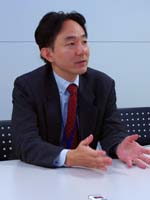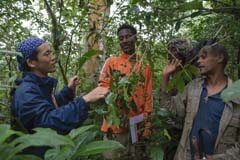InterviewJICA-RI Focus Vol. 32 - Interview with Research Fellow Daiju Narita
2015.12.28

Daiju Narita, a JICA Research Institute Research Fellow, studies climate change, energy, sustainable development, environmental economics, risk and uncertainty. He is currently engaged in a couple of research projects including: “Estimation of the Economic Value of Forests in Ethiopia” and “Economic Evaluation of Adaptation Measures to Climate Change under Uncertainty.” In light of the recent climate agreement at COP21 in Paris, we sat down with him to ask him about his research.
Profile
Narita assumed his current post after working at the Ministry of Education, Culture, Science and Technology (Japan) and the Kiel Institute for the World Economy, Germany, as a researcher.
Capturing What GDP Does Not
- What services do forests provide?
There is a discussion called "Beyond GDP," that looks for ways to quantify various benefits of ecosystem services not captured by the GDP concept. Examples of forest services include of course fuel wood and charcoal, but also providing shade for coffee trees, holding water to prevent flooding, and tourism.
We also are trying to quantify negatives such as forest degradation that are not captured in GDP. When forest stock decreases, that should affect economic indicators as well. In the current GDP system that kind of loss is not captured.
"Beyond GDP" Has Not Been Captured in Ethiopia
- What are the objectives of the research project "Estimation of the Economic Value of Forests in Ethiopia" and what results have you had so far?
We chose Ethiopia as our case because it has been experiencing a serious problem of deforestation over the past decades, and JICA has a long commitment to the country including providing assistance on forest management. JICA is conducting the Certified Forest Coffee Production and Promotion Project. The purpose is to manage and conserve forests and to promote forest coffee to help farmers economically. Our research is related to this project though not specific to that area, covering the country as a whole. It shows certain numbers about the benefits of forests in the proper sense. And that should make the benefits of the coffee project visible.

Participatory Forest Management Project in
Belete-Gera Regional Forest, Ethiopia
(Photo: JICA/Atsushi Shibuya)
So far "Beyond GDP" calcualtions have not been applied to Ethiopia. We are collecting various data on forest services in Ethiopia and have come up with certain numbers about its economic benefits to Ethiopia.
We also are documenting the literature about the cultural value of forests. They have nice national parks that attract foreign tourists, and they also have shrines. For them churches are surrounded by a patch of forest and it's very important for them to keep those trees.
For such intangible benefits of forests, we are not trying to quantify but rather to make a qualitative description.
I'm writing a draft with my collaborators. The project will be finished in March.
Pursuing Adaptation Measures rather than Mitigation Measures
- What are the objectives of the research project "Economic Evaluation of Adaptation Measures to Climate Change under Uncertainty" and what results have you had so far?"
JICA has many projects on climate change adaptation. However, we don't have any method to evaluate the effectiveness of the projects in estimating the result of adaption quantitatively. And we want to develop a method. We are doing right now a case study on the Mwea Irrigation Development Project in Kenya. It's an ongoing irrigation project and involves building a small dam in the area. It is an attempt to discern what methods we could develop to evaluate the effects of climate change adaptation projects in the future. And that's not a simple question.
What is difficult is that it is uncertain what the future effect of climate change would be if no action were taken. The outcome of "no action" should serve as a baseline for evaluations of effectiveness of adaptation measures. But we cannot afford taking no action. For instance disaster-resistant infrastructure, which is effective as climate change adaptation, has a life-span as long as several decades, so when designing such infrastructure we need to take into account the effect of climate change way before the effect of climate change come to the surface. In our project, we set the target year to 2030, which is consistent with Kenya's economic plan, and also you know it's within the lifetime of the dam that will be constructed for irrigation in Mwea. The project is important because it's kind of infrastructure assessment.
Before the beginning of the Mwea Irrigation Development Project, JICA conducted a feasibility study and it includes a cost-benefit assessment of the project plan. But climate change was not in the analysis. And now we add climate change into the analysis and we run simulations.
To take into account the effects of uncertainty, we need a theoretical basis. We are using a framework called Robust Decision Making framework that is being promoted by the World Bank and originally was proposed by the RAND Corporation, a research organization in the U.S. Normally if you evaluate certain things that involve risks, you do probabilistic assessment. So you think about certain scenarios and assign a probability to each scenario and you figure out what happens if a scenario is realized and you take a weighted average of those outcomes. With robust decision making, however, we consider all the scenarios equally. There's no weight. We don't consider any probability and we use those results. Then we show those results to the stakeholders and discuss with them what actions are preferable. Or we might use certain criteria to organize those results.
We just started simulations and are at the beginning stages. We expect to be finished with the project in approximately two years.
Most of the international discussions are now pursuing mitigation measures rather than adaptation measures. Of course we need to take actions about mitigation. It's very important, but the effects of climate change will become visible even if we stopped all emissions right now. And so we need to take some actions and start thinking about adaptation as well, no matter what we do about mitigation.
Unearthing Hidden Information as a Basis for Consensus on Climate Change
- What motivated you to pursue research on "environmental capital" and "society and the environment"?
First, to define environmental capital, it is stock, environmental stock that produces benefits to humans. So it's similar to economic capital, like factories and buildings and infrastructure. I'm interested in that topic because it makes visible what impacts the environment has on the economy and makes things visible and that gives some certain grounds for social debate about how to balance the environment and the economy. And in the end we can create consensus about large environmental issues like climate change. I think that process is important, and that's one big motivation.
One approach to solve environmental problems is litigation, or confrontation. But that approach probably doesn't work for such large, international problems as climate change or the management of forests. However, some loss of forests is positive even though they result in the emission of carbon dioxide. We need to find a balance rather than prohibit certain activities. To do that we need a consensus, and to come up with a consensus, we need objective information.
Helping Develop Method to Attach Objectivity
- How will the research contribute to "Quality Growth" and future policy?
My research is quite related to sustainability, one of the four pillars of "quality growth" because to evaluate sustainability you need some index or values. Right now GDP is not a good index to assess anything environmental and so you need to assess sustainability and sustainable development, which has also economic aspects. So you need an economic indicator that can explain the changes in the environment as well, and to do that you need a measure like what we are doing right now. It's a kind of extended GDP.
Climate change policies are not a question only for developed countries but for developing countries. Developing countries themselves must take action on climate change, mitigation and also perhaps adaptation, but they cannot do it alone and they need assistance. Developed countries are trying to increase their assistance and they established the Green Climate Fund setting a target of raising 100 billion dollars per year by the year 2020.
The Japanese government pledged that Japan will give 1.3 trillion yen in 2020 and that includes the private sector. I think JICA will be definitely one big key player in that action and JICA will need to do more about climate change.
My research should be helpful for policymaking. It's to help develop methods to evaluate JICA projects. And it has become even more important after the Paris negotiations, COP21.

事業事前評価表(地球規模課題対応国際科学技術協力(SATREPS)).国際協力機構 地球環境部 . 防災第一チーム. 1.案件名.国 名: フィリピン共和国.

事業事前評価表(地球規模課題対応国際科学技術協力(SATREPS)).国際協力機構 地球環境部 . 防災第一チーム. 1.案件名.国 名: フィリピン共和国.

事業事前評価表(地球規模課題対応国際科学技術協力(SATREPS)).国際協力機構 地球環境部 . 防災第一チーム. 1.案件名.国 名: フィリピン共和国.

事業事前評価表(地球規模課題対応国際科学技術協力(SATREPS)).国際協力機構 地球環境部 . 防災第一チーム. 1.案件名.国 名: フィリピン共和国.

事業事前評価表(地球規模課題対応国際科学技術協力(SATREPS)).国際協力機構 地球環境部 . 防災第一チーム. 1.案件名.国 名: フィリピン共和国.
scroll